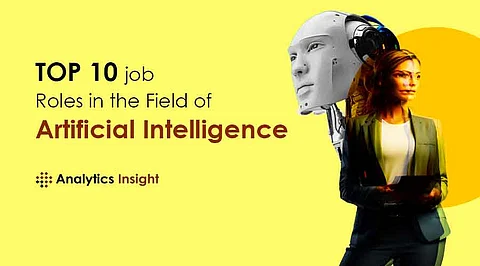

In the rapidly evolving landscape of technology, Artificial Intelligence (AI) has emerged as a transformative force, reshaping industries, and creating new opportunities for professionals across the globe. As AI continues to gain prominence, so does the demand for skilled individuals who can harness its potential. If you're looking to embark on a career in AI or make a transition into this exciting field, here are the top 10 job roles that you should consider:
Machine Learning Engineers are on the cutting edge of AI development. They design and implement complex algorithms and models that enable machines to learn from data and make predictions or decisions. This role requires expertise in programming languages like Python, deep knowledge of machine learning frameworks, and a knack for optimizing algorithms.
Data Scientists are the detectives of AI, using their analytical skills to extract insights from large datasets. They are responsible for data cleaning, analysis, and developing predictive models. A solid understanding of statistics, data visualization, and domain knowledge is crucial for this role.
AI Research Scientists are the innovators who push the boundaries of AI technology. They work on cutting-edge research projects, develop new algorithms, and publish research papers. This role requires a solid academic background, often with a Ph.D. in AI-related fields.
As AI becomes more integrated into society, ethical considerations are paramount. AI ethicists ensure that AI systems are developed and deployed in a fair, unbiased, and responsible manner. They help organizations navigate the complex ethical dilemmas associated with AI.
AI Product Managers bridge the gap between technical teams and business stakeholders. They define the product roadmap, prioritize features, and oversee the development of AI-powered products and services. This role demands a blend of technical knowledge and business acumen.
NLP Engineers specialize in developing AI applications that can understand and generate human language. They work on chatbots, language translation, sentiment analysis, and more. Proficiency in linguistics and NLP libraries is critical in this role.
Computer Vision Engineers focus on enabling machines to interpret and understand visual information from the world. They work on applications such as facial recognition, object detection, and autonomous vehicles. Expertise in image processing, neural networks, and deep learning is crucial here.
AI Solutions Architects design the overall AI systems and strategies for organizations. They assess business needs, select appropriate AI technologies, and guide the implementation process. This role demands a holistic understanding of AI technologies and their integration.
AI Trainers/Annotators play a critical role in creating and maintaining AI datasets. They label and annotate data, ensuring that machine learning models receive high-quality training data. Attention to detail and domain knowledge are essential attributes in this role.
Robotics Engineers combine AI with mechanical engineering to create intelligent robots and autonomous systems. They work on tasks ranging from industrial automation to healthcare robots. Proficiency in robotics, control systems, and AI algorithms is vital for success.
In addition to these specialized roles, the field of AI also offers opportunities for professionals in supportive roles, such as AI recruiters, AI project managers, and AI business consultants. As AI technology continues to advance, new roles will likely emerge, creating a dynamic and ever-evolving job market.
To prepare for a career in AI, individuals should consider pursuing relevant education and certifications. Many universities and online platforms offer AI courses and degrees, making it accessible to a wide range of learners. Hands-on experience through projects and internships can also be invaluable in building practical skills.
The field of Artificial Intelligence is bursting with opportunities for those who are passionate about shaping the future of technology. Whether you are interested in developing cutting-edge algorithms, ensuring ethical AI practices, or building AI-powered products, there is a role for you in this dynamic and exciting field.
Join our WhatsApp Channel to get the latest news, exclusives and videos on WhatsApp
_____________
Disclaimer: Analytics Insight does not provide financial advice or guidance. Also note that the cryptocurrencies mentioned/listed on the website could potentially be scams, i.e. designed to induce you to invest financial resources that may be lost forever and not be recoverable once investments are made. You are responsible for conducting your own research (DYOR) before making any investments. Read more here.
